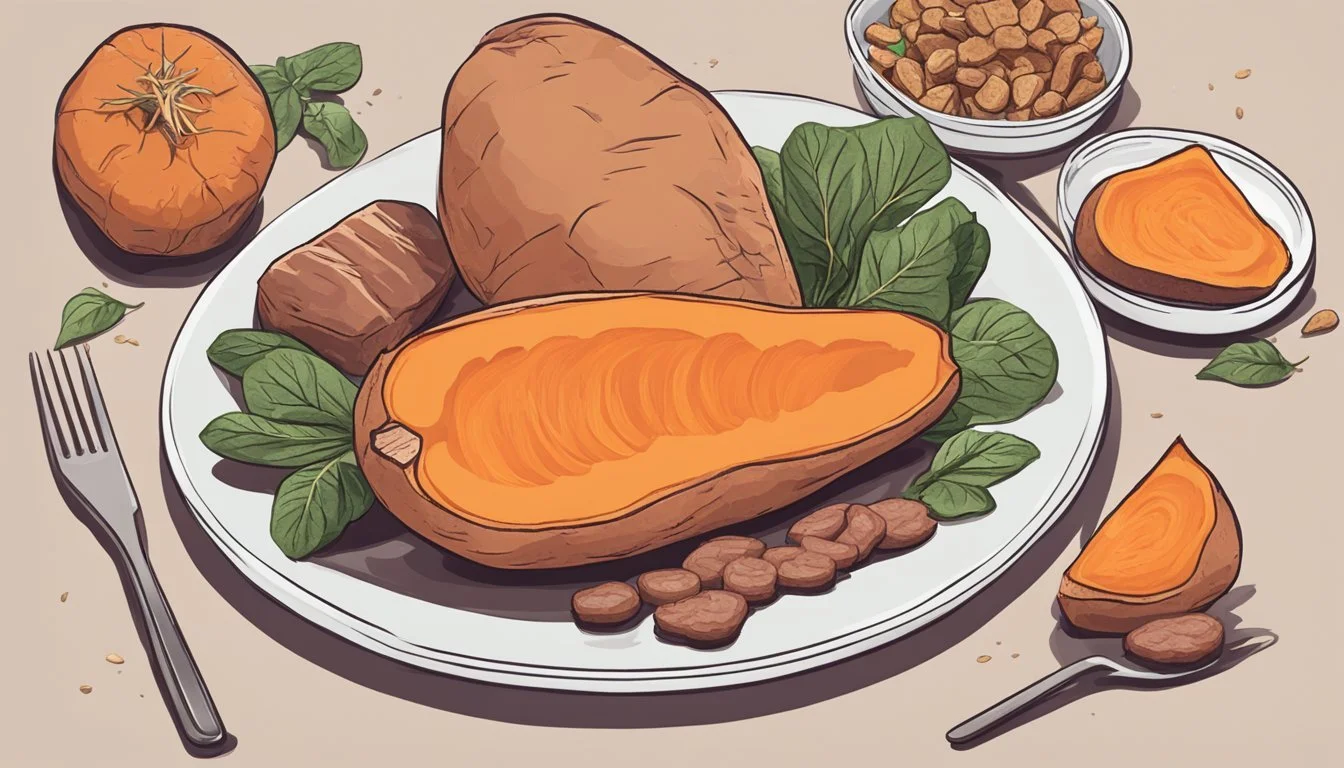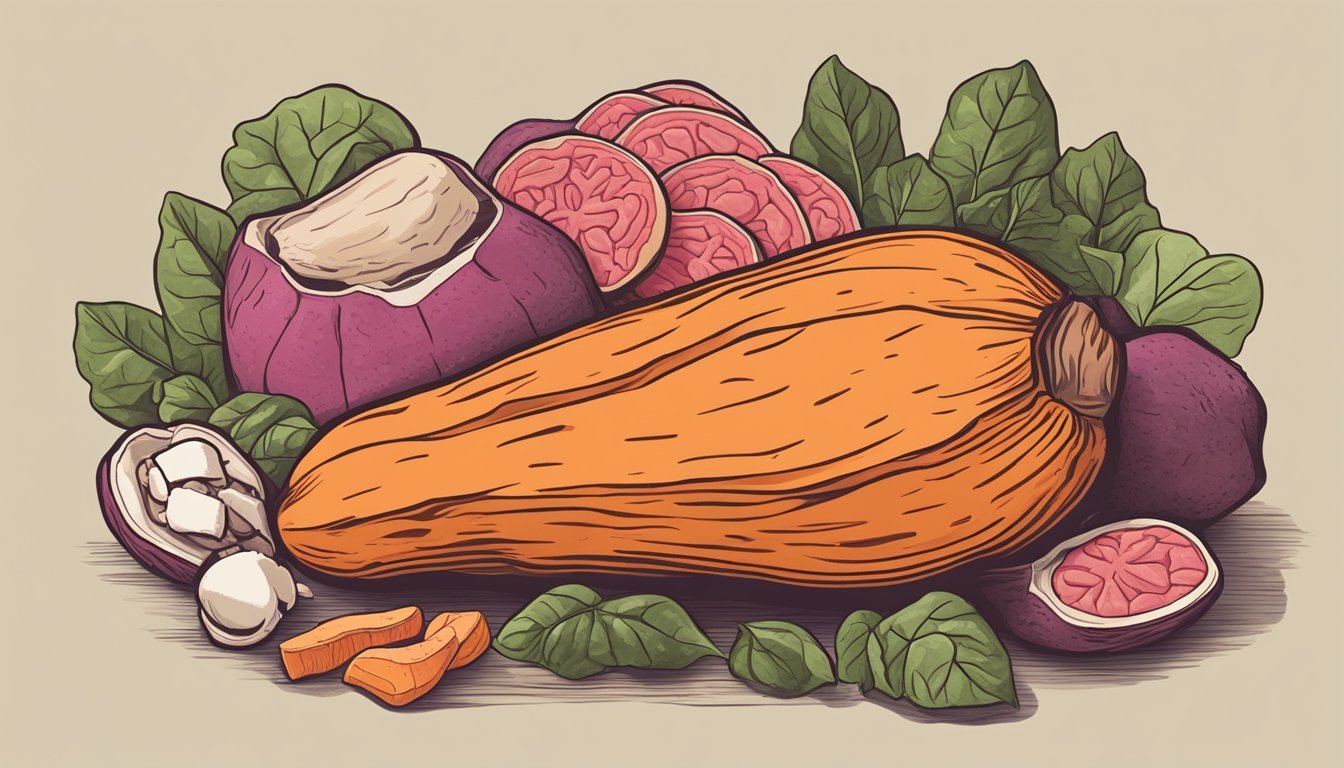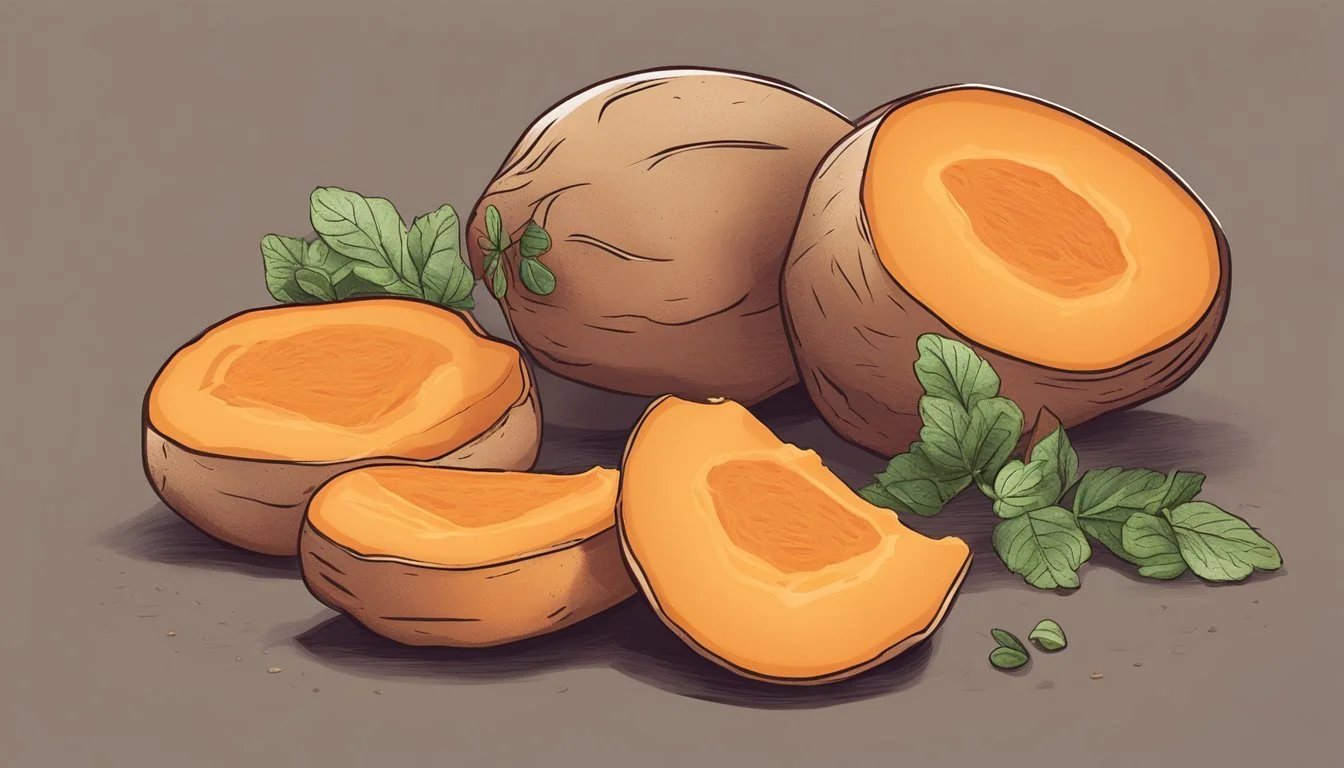Sweet Potato on Carnivore Diet
Evaluating the Prospects
The carnivore diet is a dietary regimen that involves exclusive consumption of animal products and excludes all plant-based foods. It is predicated on the belief that human dietary requirements can be comprehensively met by animal meats, organs, eggs, and selected dairy products, such as cheese and heavy cream. Advocates of this diet suggest that it may provide various health benefits, including weight loss, reduced inflammation, and improved metabolic outcomes.
Sweet potatoes (What wine goes well with potatoes?), despite their rich nutritional profile, do not fit within the carnivore diet's framework. They are high in beta-carotene, vitamins, and fiber, but as a starchy root vegetable, they are categorically excluded from this animal-based diet. The inclusion of any plant-based food, sweet potatoes included, is contrary to the guiding principles of the carnivore diet, which maintain that animal foods can fully support human health without the need for plant-derived nutrients.
Understanding the Carnivore Diet
In elucidating the carnivore diet, it's essential to discern it as a regimen composed strictly of animal products and the exclusion of plant-based nourishments.
Core Principles and Foods
Principles: The carnivore diet hinges on the belief that ancestral eating focused primarily on animal products and that modern health issues can be mitigated by returning to such a diet.
Foods: The diet includes:
All types of animal meats: beef, poultry, pork, lamb
Seafood: fish, shellfish
Animal organs: liver, kidney
Eggs
Dairy products: milk, cheese, and heavy cream
Fruits, honey, coffee, tea, and certain spices are permitted by some variations.
Health Benefits and Risks
Benefits: Proponents argue that the diet leads to:
Weight loss and ketosis, similar to the keto diet
Reduced inflammation and joint pain
Lowered blood sugar levels, potentially benefiting insulin resistance
Mental clarity purportedly due to the removal of sugar and lower fluctuation in blood sugar levels.
Risks: A diet high in animal products may lead to:
Increased cholesterol levels
Potential risks of nutrient deficiencies
Research: Contemporary research on long-term effects is limited, thus ongoing scientific investigation is crucial.
Comparison With Ketogenic and Other Low-Carb Diets
Both the ketogenic and carnivore diet can induce ketosis, but the carnivore diet is more restrictive.
Low-carb diets often include plant-based foods and are not as protein-centric as the carnivore diet.
The carnivore diet is a form of an all-meat diet that excludes even the low-carb vegetables permitted in a standard keto diet.
In terms of health conditions, it's suggested that both diets could potentially alleviate symptoms of autoimmune conditions by reducing dietary triggers.
Sweet Potatoes In the Diet
Sweet potatoes are a root vegetable rich in vitamins, fiber, and antioxidants but are high in carbs. They are excluded from the carnivore diet, which focuses solely on animal products.
Nutritional Profile
Sweet potatoes are a dense source of nutrients, providing a high amount of vitamin A and potassium, along with significant levels of copper and carotenoids. The average sweet potato contains:
Calories: 86
Protein: 1.6 g
Carbs: 20.1 g
Fiber: 3 g
Vitamin A: 14,187 IU
Vitamin C: 2.4 mg
Potassium: 337 mg
Copper: 0.1 mg
Health Implications
Their high fiber content can aid in digestion and contribute to cardiovascular health. The antioxidants in sweet potatoes, which include various carotenoids, help combat oxidative stress in the body. However, the high carbohydrate content may be incompatible with the goals of a carnivore diet, which restricts carbohydrate intake.
Carnivore Diet Adaptations
For someone following a carnivore diet, the inclusion of sweet potatoes is generally not an option due to their plant-based nature. The carnivore diet emphasizes animal products such as:
Seafood
Organs
Eggs
Select dairy products
Sweet potatoes, as a carbohydrate source, are contrary to the carnivore diet's principles. Although some individuals may choose to include certain plant-based items, this is considered an adaptation and not standard for the traditional carnivore diet framework.
Carnivore Diet and Carbohydrates
In a carnivore diet, carbohydrates are notably absent since the focus is exclusively on animal-based foods. This section explores how the absence of carbs impacts those following the diet and strategies for dealing with carbohydrate cravings.
Effects of Carbs on Carnivore Diet
Carbohydrates, which include sugars, starches, and fiber, are the body's main source of energy in most diets. On a carnivore diet, the intake of carbs is minimal to nonexistent, leading to a state of ketosis where the body burns fat for fuel. Without carbohydrates, blood sugar levels are typically more stable, sidestepping the common blood sugar spikes that can lead to energy crashes and cravings. However, individuals with diabetes or metabolic disorders should approach this diet with caution and under medical supervision, due to its significant alteration of typical carbohydrate intake.
The near absence of fiber from the carnivore diet is another consideration, as this nutrient is found only in plant foods like vegetables and grains. Fiber aids in digestion and has been linked to various health benefits, although its necessity is debated among carnivore diet proponents.
Managing Cravings and Sweet Tooth
For those with a sweet tooth, adjusting to the carnivore diet's lack of sweet flavors can be challenging. Traditional sweeteners and foods with a high glycemic index are eliminated in this diet, including sweet potatoes. However, cravings can be managed through several strategies:
Diet-Friendly Sweeteners: Utilize animal-based or zero-carb, artificial sweeteners only if they are deemed acceptable on one's specific carnivore diet plan.
Satisfy Cravings with Fats: Healthy fats from sources like animal fat, eggs, and dairy may help dampen sweet cravings by providing satiety and a richer taste profile.
Behavioral Adjustments: These include distraction techniques, such as going for a walk or engaging in a hobby when cravings strike.
It's crucial for individuals to ensure they are not replacing important nutrients they would typically receive from a more varied diet when eliminating carbohydrates, especially if choosing to incorporate some low-carb sweet treats. Variety within the confines of the diet can assist in keeping cravings at bay while prioritizing health and nutritional adequacy.
Incorporating Sweet Potatoes Moderately
Sweet potatoes are considered off-limits in a strict carnivore diet, which focuses solely on animal products. However, individuals following a more relaxed approach may contemplate their moderate inclusion due to their nutritional value.
Possible Health Benefits
Sweet potatoes are a nutrient-dense food, high in soluble fiber, which contributes to a sense of fullness and has a positive impact on blood sugar modulation. The fiber content aids in digestion and supports a healthy gut microbiome. They're also packed with essential vitamins and minerals, which can complement a carnivore diet's emphasis on protein and fat from animal sources, potentially reducing health problems associated with nutrient deficiencies.
Vitamins: Rich in Vitamin A (from beta-carotene), C, and various B vitamins
Minerals: Good source of manganese, copper, and potassium
Recommendations for Intake
When considering the addition of sweet potatoes to a carnivore diet, one should do so with caution to maintain the diet's integrity. To minimize risks, here are some specific recommendations:
Moderation: Incorporate small quantities of sweet potatoes; consider them as occasional add-ons rather than a diet staple.
Preparation: Opt for boiled or baked sweet potatoes without added sugars or fats.
By being mindful of these guidelines, one can experience the health benefits of sweet potatoes without derailing the primary focus of the carnivore diet.
Carnivore-Friendly Desserts and Recipes
This section covers how one can indulge in sweet treats within the boundaries of a carnivore diet using animal-based products and presents specific sweet potato-inspired carnivore desserts.
Utilizing Animal-Based Ingredients
Animal-based ingredients form the foundation of carnivore diet desserts. Recipes on a carnivore diet focus solely on ingredients derived from animals, ensuring desserts align with dietary constraints. Common components include:
Egg yolks: Used in custards and ice creams for their rich texture and emulsifying properties.
Heavy cream and butter: Offer a high-fat base for whipped cream and buttery desserts like carnivore cheesecakes and panna cotta.
Gelatin: Acts as a thickening agent for mousse, gelatin-based desserts, and certain types of carnivore cake.
Sweeteners: Although traditional sweeteners are generally avoided, natural sweeteners like stevia can be used sparingly in moderation.
Sweet Potato Inspired Carnivore Desserts
Given that sweet potatoes are not permitted on a carnivore diet, individuals often seek alternatives to mimic the taste and satisfaction of sweet potato desserts. Innovative adaptations may include:
Carnivore cheesecake: Blended cooked egg yolks, vanilla extract, and a touch of stevia to create a sweet potato-like flavor profile.
Carnivore donuts: Use a combination of egg yolks, heavy cream, and gelatin to achieve a dense, cake-like texture resembling sweet potato donuts.
Important: While these adaptations aim to recreate the flavors associated with sweet potato desserts, they strictly adhere to the carnivore diet principles by only using animal-derived ingredients.
Supplementing Essential Nutrients
Essential nutrients are vital for maintaining health; on the carnivore diet, supplementation may be necessary to meet nutritional needs that meat alone cannot provide.
Vitamins and Minerals on Carnivore Diet
The carnivore diet primarily includes animal products, which can supply a range of vitamins and minerals. However, there may be gaps that need to be filled. For example, magnesium is an important mineral for the body's equilibrium, but its content in foods like bone broth can vary. Therefore, supplementation could be important.
Vitamin C: While animal-sourced foods contain vitamin C, the amount may not meet the Recommended Dietary Allowance (RDA), especially if the meat is heavily cooked or processed. Fresh meats are more likely to provide sufficient vitamin C without the need for supplements.
Multiminerals: To address potential deficiencies, a multimineral supplement could provide magnesium, potassium, selenium, and other minerals lacking in a meat-heavy, low-carb diet.
Online stores offer unbeatable prices for vitamin C, magnesium, and potassium, so don't miss out!
Role of Sweet Potatoes
Sweet potatoes are rich in various nutrients and are not typically included in the carnivore diet due to its strict animal-sourced foods paradigm. They are a source of:
Fibers: Beneficial for digestive health.
Vitamins and Minerals: Particularly high in vitamin A, vitamin C, and manganese.
Energy: Their carbohydrate content offers an energy source that is absent in a carnivore diet.
Fats: They contain virtually no fat, which is already abundant in a carnivore diet, and hence do not contribute saturated or unsaturated fats.
Sweet potatoes might be considered as a nutritional supplement for their vitamin and mineral content, but they clash with the fundamental principles of the carnivore dietary pattern, which excludes plant-based foods.
Practical Cooking and Preparation Tips
In this section, readers will gain insights into proper storage and cooking techniques for sweet potatoes, as well as the fundamental kitchen tools to have on hand when following a carnivore diet.
Sweet Potato Handling and Cooking
When dealing with sweet potatoes, it is essential to store them in a cool, dark place to preserve their rich colors and textures. Prior to cooking, one should thoroughly wash the skin to remove any dirt. Sweet potatoes can be prepared in a variety of methods, each enhancing their natural sweetness.
Roasting: Coat diced sweet potatoes with olive oil and a pinch of salt, then roast in an oven preheated to 425°F (220°C) until tender.
Baking: For a simple bake, pierce the sweet potatoes with a fork, and place them in a 400°F (200°C) oven until they can be easily pierced with a fork.
Microwave: For a quick option, microwave the sweet potatoes after piercing the skin, on high for 5-8 minutes, turning halfway through.
Sweet Potato Fries: Slice into thin wedges, toss in olive oil and spices, and bake at 450°F (230°C) until crisp.
Casserole: Layer sliced sweet potatoes with garlic and herbs in a dish, and bake until they're fork-tender.
Carnivore Diet Kitchen Essentials
Individuals adhering to the carnivore diet should prioritize kitchen tools that cater to preparing animal-based products; however, having the flexibility to accommodate the occasional plant-based item like sweet potatoes can enhance the diet's variety. Staple kitchen items include:
Sharp Knives: Essential for precise cutting of meats and vegetables alike.
Cast Iron Skillet: Ideal for achieving a perfect sear on steaks and for roasting or baking.
Baking Sheets and Parchment Paper: Necessary for baking sweet potato fries or casseroles evenly.
Heavy-Duty Cutting Board: It serves the dual purpose of prepping meats and dicing sweet potatoes.
Mixing Bowls: They are versatile for combining spices with olive oil for roasting or tossing fries.
While sweet potatoes are not typically included in a carnivore diet, knowing how to properly handle and prepare them enriches one's culinary experience. The key kitchen essentials also aid in preparing a wide range of carnivore-friendly dishes, ensuring mealtime remains diverse and enjoyable.
Discover the endless possibilities of buying sharp knife, cast iron skillet, baking sheet, parchment paper, cutting board, and mixing bowl online!












